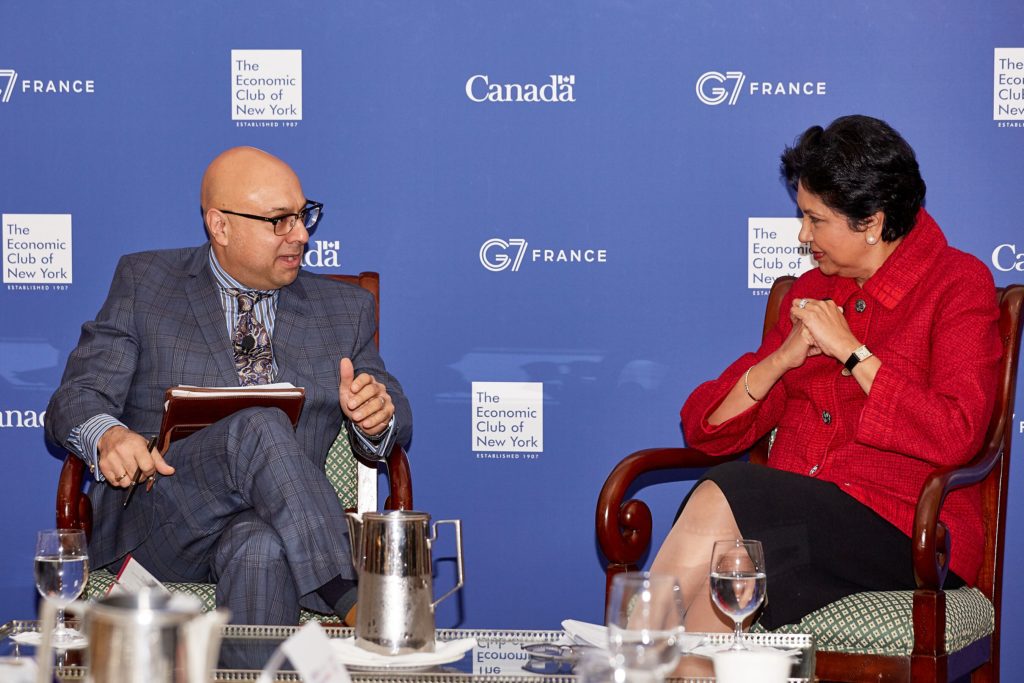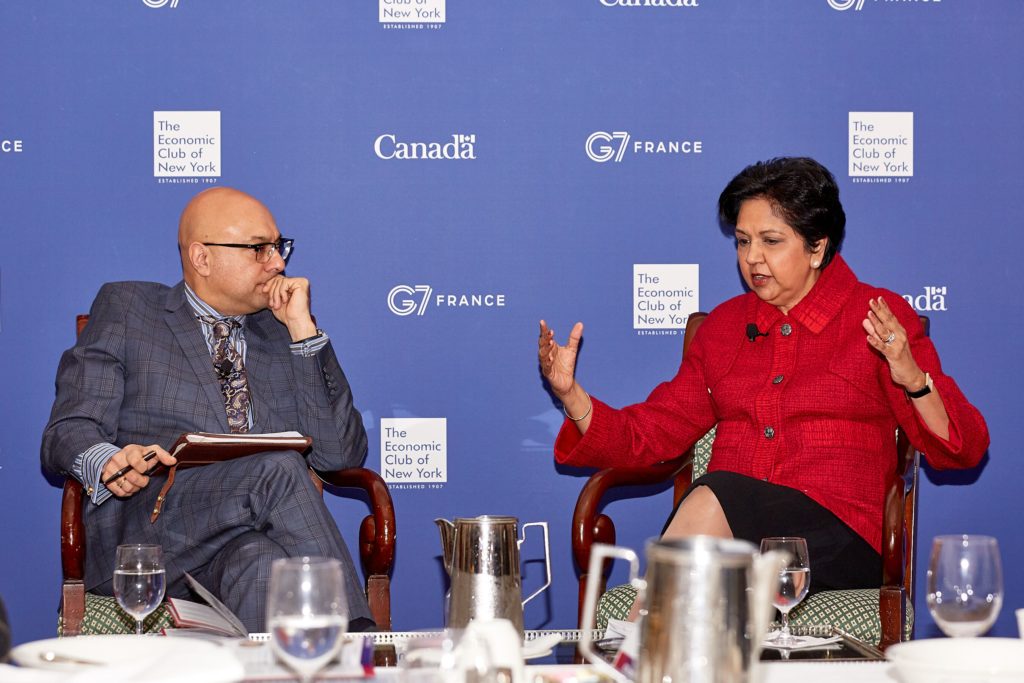
Kemi Osukoya
THE AFRICA BAZAAR MAGAZINE
March 18, 2019
FORMER CHAIRMAN AND CHIEF EXECUTIVE OFFICER of PepsiCo Indra Nooyi said bad normative behavior such as eye-rolling from men when women speak during board meetings or referring to women in senior leadership positions as “sweetie” are some of the unconscious gender bias against women that need to be deracinated and strongly discouraged by corporate boards and men in executive positions in order to facilitate gender equality in corporate leaderships.
“Boards should welcome women, should want to listen to them,” said the former executive in response to a question on how to get corporate boards to mandate and improve the pipeline of getting women into top leadership positions and corporate boards. “I can tell you based on my own experience that many times when women are on boards, they are in the minority, they get talked over, and I have [seen] some men rolled their eyes when women talked at meetings, men called women ‘sweetie’ – I have watched it all and that has to change. That environment has to change because you don’t just put women on the boards as a symbolic gesture. You put a woman on the board because she’s going to make a difference and she’s going to make a difference if given a chance and that’s what brings change.”
The former chairman and CEO made the remarks during a fireside chat conversation last week at the Economic Club of New York’s Women in Business Return on Investment Summit in New York city, part of a series of women leadership summits taking place during Women’s History Month this year.
Ms. Nooyi, who became President of PepsiCo in 2000 and later ascended to lead the consumer company as CEO from 2006 until 2018 and as Chairman of Board of Directors until early 2019 when she retired from the company, was one of the top 25 women CEOs to lead Fortune 500 companies. She said women’s entrance into senior leadership positions at big corporate firms and boards continue to face major setbacks even though statistics have shown that women obtained 50 percent of post graduate degrees and 85 percent of household buying decisions are made by women.
“They have done the analysis on companies that showed companies that have two or more women, and large numbers of women in the C-suite perform better than companies that don’t have this number,” Nooyi said. “The numbers are right there in front of us, the math that leads to those numbers is also there. [However], there’s some value that is preventing people from internalizing these numbers that are saying something have to change in our companies. I don’t think [firms] go to colleges and not see that the top grades are being obtained by women, that 47 percent of engineers at MIT are women. I think we have to ask ourselves as a country, are we underutilizing this incredible talent space of educated women that are driven, aggressive and aspirational and passionate about what they do and then we labeled them emotional? I think we do women a big disservice.”
She added, “I think one of the investors’ roles is to request that women be put on the [corporate] boards. Companies with women on their board have better innovation performance, better revenue performance and better cashflow performance. The big difference is that when women are on board, companies focus on the durations of the returns. When women are not on board, they focus on the short-term returns. Having women on board actually build more sustainable, strong enterprises overtime. It’s just that companies have to internalize the statistic and buy into it.”
When asked if mandates such as the one recently passed into law in California requiring that women be included on corporate boards would help close the gender gap and bring more awareness to the gender imbalance issues in corporations, Nooyi answered that the “fact that only 20-26 percent of American companies have women on their corporate boards is a problem by itself because there is enough qualifying women to fill the positions.”
She stated that investors have a huge role to play in changing the mindsets of those who are governing corporations or in senior leadership positions because it involves investors’ money and they can make sure the right people get elected to the corporate boards. She said investors can also bring much needed awareness to the issue by using some of the tactics they have used to get certain results from companies such as diversifying themselves and forcing certain metrics on corporate executives. However, she noted that having a serious conversation about gender diversity that can lead to pay parity and gender parity is a long-term journey that requires bold actions and collaborations from both the investors and those in executive positions to invest in long-term pipelines within companies, which will help in bringing women to the forefront, and having the patience for it to come to fruition, understanding that it will be good for the enterprise on the longterm but need the right investment on the short term.
“They have done the analysis on companies that showed companies that have two or more women, and large numbers of women in the C-suite perform better than companies that don’t have this number.”
Nooyi said even though the MeToo movement has raised awareness about gender issues and some of the challenges that women face at work, balancing work and family is still a major challenge for many women. She noted that the American work ecosystem doesn’t provide the opportunities for women to work and raise children at the same time, and attributed it to one of the reasons why most women in executive or senior leadership positions drop out or step off the workforce. She said for many women and families, it’s a tough balance and a huge issue because having and raising a kid is a full-time job just as being an executive is a full-time job as well.
“It’s a real family issue: childcare, parental leave, flexible work hours-today, men are also participating in child care. There’s so many things that have to change in the society so that we can get the 2.1 kids out of every family and have large representation of women in the workforce because only that combination works for the country in terms of moving ahead and how we solve that is one of the biggest issues that we have to reckon with over the next two to three years.” Nooyi noted.

Nooyi stated that fixing some of these unconscious and conscious bias against women within corporations as well as in the societies require commitments, holding corporations and those in corporate leadership positions accountable. She emphasized that there’s no point in bringing women into companies if they are not given the opportunities to function effectively at the workplace, and not given the ability to work and have a family or access to the right jobs. She noted that women are often given administrative or general counsel jobs, including human resources jobs where women hold 45 percent of the jobs. She said some of these biases are deeply entrenched in our cultures and societies that perpetrators of such behavior often do them intuitively and inadvertently because they are considered normal behavior in the societies. She said changing those behavior will require training, and retraining people until societies get it right.
“We have to fix the whole unconscious and conscious bias in companies and we have to talk about giving women the ability to work and have a family,” Nooyi said. “How do we give women the right jobs and put them pipeline positions, even today some of these jobs are considered more of men jobs, staff positions are considered women’s jobs — so how do we make it work for women to have these operative jobs? And finally, if 45 percent of HR women jobs are held by women, how do you hold those HR accountable to make sure women have pay parity as equal to men for all the work that they do. I think there’s a lot of steps that we have to take and it’s important that we match through those steps as opposed to expecting that people will mandate for parity of women. It has to be systematically driven.”
Nooyi said when someone notices a bad behavior, they should speak up. She underscored that companies have to put in place good values and leave by those values.
Speaking about the recent waves of companies participating in social justice and environmental issues, Nooyi said, “To me figuring how to spend the money you make without fundamentally changing the way you make money is where the problems come from because spending the money you make is corporate social responsibility. Changing the way you make money is operating with purpose. In PepsiCo case, if we didn’t have people-led agenda that brought women into the company, promote diversity, and inclusion, if it didn’t change the portfolio, it couldn’t sustain the returns. If we didn’t reduce our environment footprints, we couldn’t reduce cost and won’t get license to operate in societies around the world. We couldn’t deliver performance without an environmental agenda.”



